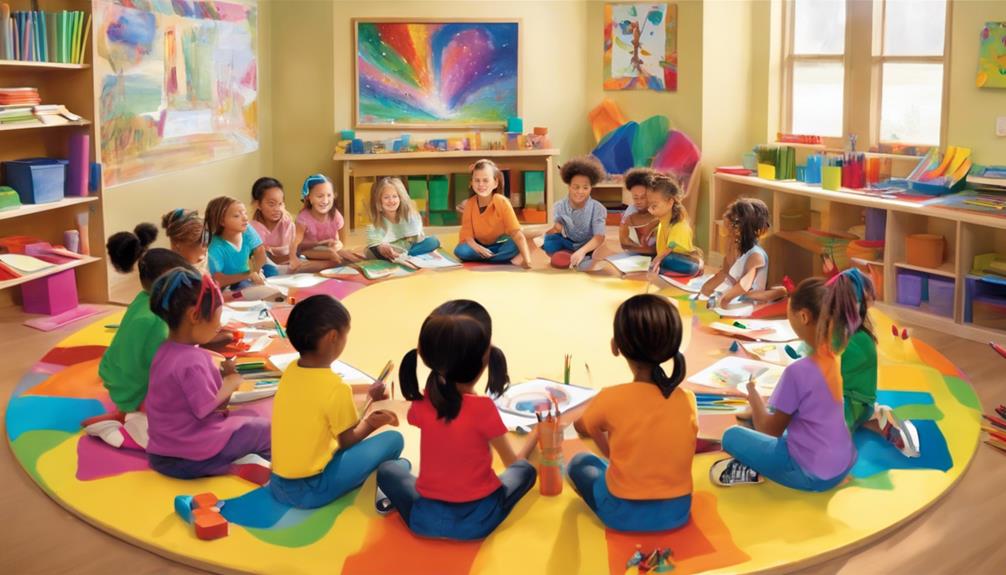We recently came across a staggering statistic that highlights the prevalence of divorce: approximately 40-50% of marriages in the United States end in divorce.
Dealing with the aftermath of such a significant life event can be incredibly challenging, but there are effective ways to cope and move forward. From acknowledging your emotions to creating a new routine, these strategies can help you navigate the complex emotions that come with the loss of a marriage.
Discovering how to heal and grow from this experience is crucial, and we'll be exploring ten key ways to aid in this journey.
Key Takeaways
- Acknowledge and validate post-divorce emotions to begin the healing process.
- Prioritize personal growth through new activities and self-care routines.
- Seek professional support like therapy for emotional exploration and coping strategies.
- Establish clear boundaries with the ex-partner to promote well-being and stability.
Acknowledge Your Emotions
In order to navigate the challenging emotional landscape post-divorce, it's vital to acknowledge and validate the myriad feelings that may surface. Divorce can trigger a wave of grief that encompasses sadness, anger, confusion, and even relief.
It's essential to recognize that feeling a mix of emotions after a divorce is normal, even if it was a decision you made. Suppressing these emotions can prolong the healing process and hinder personal growth. We must give ourselves permission to feel and express these emotions without judgment or criticism.
Seek Professional Help

Facing the aftermath of a divorce can be overwhelming, and seeking professional help is a crucial step in the healing process.
Therapists provide a safe environment for us to share our feelings, offer guidance on coping strategies, and support us as we navigate this challenging period.
Therapy for Healing
Navigating the emotional challenges of divorce can be a daunting journey, but seeking professional therapy offers a supportive path towards healing and growth.
Therapy post-divorce is crucial for addressing mental health, processing divorce grief, and identifying effective coping strategies. Professional help provides a safe and non-judgmental space to explore complex emotions, gain insights into the grieving process, and rebuild self-esteem.
Therapists guide individuals through the stages of divorce, helping manage its mental health effects and address unresolved issues from the marriage. Sessions focus on self-care, emotional regulation, and developing healthy coping mechanisms to facilitate a positive path forward.
Investing in therapy post-divorce is an essential step towards healing and creating a fulfilling life beyond the pain of separation.
Counseling for Support
Seeking professional counseling after a divorce can provide valuable support and guidance during a challenging and emotional time. Therapy sessions with professional therapists offer a safe and non-judgmental space for processing emotions and learning effective coping strategies. These sessions help individuals explore their feelings, understand their grief, and take steps towards healing.
Guidance From Experts
During this challenging period post-divorce, turning to professional experts for guidance can provide valuable support and aid in navigating the complex emotions associated with loss. Seeking help from therapists is crucial in processing the grief after divorce effectively. Here are some reasons why professional help is beneficial:
- Therapists offer a non-judgmental space for individuals to explore their feelings.
- Therapy sessions can provide valuable insights and coping strategies tailored to individual needs.
- Professional help assists in understanding and accepting the loss, managing emotions, and setting healthy boundaries for grief.
- Working with a therapist empowers individuals to prioritize self-care, develop coping mechanisms, and foster personal growth during the divorce recovery period.
Lean on Your Support System

In times of loss after divorce, connecting with our support system can offer essential emotional comfort and understanding. It's important to reach out to friends, family, or support groups during this challenging period.
Surrounding ourselves with individuals who can provide a listening ear and offer encouragement can make a significant difference in our healing journey. Sharing our feelings and experiences with a trusted person can help alleviate the burden of grief and loneliness that often accompanies divorce.
If needed, seeking professional help to process emotions and gain additional support is a proactive step towards coping with the loss. Building a strong support network enables us to navigate the complexities of divorce grief and find solace through shared experiences and empathy.
Engage in Self-Care Practices

As we navigate through the challenges of loss after divorce, engaging in self-care practices becomes vital for our well-being and healing journey. Here are some essential self-care activities to consider during this healing process:
- Mindfulness: Taking time to be present in the moment can help alleviate stress and anxiety, promoting emotional stability.
- Exercise: Physical activity releases endorphins, which can boost mood and contribute to overall mental health.
- Healthy Eating: Nourishing your body with nutritious foods can have a positive impact on both your physical and emotional well-being.
- Setting Boundaries: Establishing boundaries with others and yourself is crucial for maintaining personal growth and protecting your mental health.
Explore New Hobbies and Interests

Exploring new hobbies and interests post-divorce can be a transformative journey towards rediscovering personal passions and fostering self-growth. After a significant life change like divorce, delving into new activities such as painting, gardening, or hiking can bring a renewed sense of fulfillment and joy.
Trying out different hobbies not only opens doors to personal growth and self-discovery but also provides a positive distraction during the healing process. Engaging in group activities or classes related to these interests can also offer the chance to meet new people and expand social circles, creating a supportive environment for your journey of exploration.
Embracing new hobbies isn't just about trying something different; it's about reconnecting with yourself on a deeper level and finding solace in activities that resonate with your true essence. So go ahead, step into the world of exploring new hobbies, and let it guide you towards healing and new beginnings.
Practice Mindfulness and Meditation

Let's explore the benefits of mindfulness and the techniques for meditation to help navigate the challenges of post-divorce life.
Mindfulness can assist in reducing stress and anxiety, fostering a sense of presence without judgment.
Benefits of Mindfulness
How can mindfulness and meditation benefit individuals coping with the grief of divorce? Engaging in these practices can significantly aid in managing the stress, anxiety, and self-awareness challenges that often accompany this difficult time. Here are some ways mindfulness and meditation can help:
- Reduction of stress, anxiety, and depression levels.
- Promotion of emotional regulation and relaxation through techniques like deep breathing.
- Enhancement of coping skills and emotional resilience.
- Cultivation of self-compassion, self-care practices, and inner peace.
Techniques for Meditation
Engaging in mindfulness and meditation techniques after a divorce can provide a grounding and healing practice for individuals navigating through the emotional aftermath of separation.
Mindfulness meditation, which involves focusing on the present moment without judgment, aids in processing emotions post-divorce. Techniques like deep breathing, body scanning, and loving-kindness meditation can help individuals observe their thoughts and emotions without becoming overwhelmed, fostering inner peace.
Regular meditation practice enhances emotional regulation, resilience, and overall well-being. By incorporating meditation into your daily routine post-divorce, you can promote relaxation, clarity of mind, and a greater sense of emotional stability.
These practices offer a supportive approach to finding solace and building inner strength during this challenging time.
Focus on Personal Growth

Embracing self-reflection after a divorce can pave the way for personal growth opportunities and a brighter future ahead. During this challenging time, focusing on personal development is crucial for healing and moving forward. Here are some ways to nurture your growth:
- Explore New Hobbies and Interests: Engaging in activities that bring you joy can help you discover new passions and talents, leading to personal enrichment.
- Seek Therapy or Counseling: Professional help can provide a safe space to work through your emotions, gain self-awareness, and develop healthy coping mechanisms.
- Set Achievable Goals: Establishing realistic goals for self-improvement can give you a sense of purpose and direction as you navigate this transformative period.
- Prioritize Self-Care: Taking care of your mental, emotional, and physical well-being is essential. Practice self-care routines that nourish your soul and promote healing.
Set Boundaries With Your Ex-Partner

Setting clear boundaries with your ex-partner is essential for maintaining emotional distance and fostering a healthy post-divorce relationship. When going through the grieving process, establishing boundaries can help navigate the complexities of co-parenting dynamics and reduce potential conflicts. By clearly communicating your needs and expectations, you create a foundation for a more peaceful and respectful interaction with your ex-partner.
To better understand how setting boundaries can positively impact your post-divorce life, let's look at the following table:
| Benefits of Setting Boundaries |
|---|
| Manages co-parenting dynamics |
| Ensures children's well-being |
| Reduces misunderstandings |
| Promotes self-care |
| Facilitates a smoother transition |
Consider Therapy or Counseling

Therapy or counseling can be incredibly beneficial for those navigating the complexities of loss after divorce. It provides a supportive environment where individuals can work through their emotions and gain valuable insights.
Seeking professional guidance is a proactive step towards healing and developing healthy coping mechanisms.
Therapy Benefits
Navigating the challenges of divorce grief can be significantly aided by seeking professional therapy or counseling, providing a safe and supportive space to process emotions and facilitate personal growth. Therapy benefits include:
- Emotional Exploration: Therapists offer non-judgmental support to effectively process grief.
- Insightful Guidance: Sessions help individuals understand post-divorce emotions, behaviors, and thought patterns.
- Coping Strategies: Counseling assists in developing effective coping mechanisms and improving communication skills.
- Personal Growth: Therapy aids in rebuilding self-esteem, resilience, and a renewed sense of identity post-divorce.
Professional Guidance
After exploring the benefits of therapy post-divorce, it becomes evident that seeking professional guidance through counseling can provide invaluable support in navigating the complexities of grief and healing. Therapy or counseling offers a safe space for emotional exploration, helping individuals process complex emotions and adjust to life changes. Therapists assist in developing coping mechanisms, understanding behavioral patterns, and managing intense emotions tied to the divorce experience. These sessions not only support mental well-being but also foster personal growth, resilience, and aid in transitioning to a new chapter in life. Seeking professional guidance can be instrumental in rebuilding oneself and finding stability amidst the upheaval of family dynamics post-divorce.
| Benefits of Professional Guidance | |
|---|---|
| Emotional Exploration | Coping Mechanisms and Resilience Building |
| Understanding Behavioral Patterns | Support for Transitioning to a New Chapter |
Create a New Routine

Establishing a new routine post-divorce can be a valuable tool in providing structure and stability during a time of upheaval. Transitioning into this new phase of life can feel overwhelming, but creating a daily schedule can help in managing emotions and adjusting to the changes post-divorce.
Here are some tips to guide you through this process:
- Include Self-Care Activities: Incorporating self-care activities such as meditation, reading, or taking a relaxing bath can nurture your emotional well-being.
- Prioritize Healthy Habits: Make sure to prioritize healthy habits like regular exercise, balanced nutrition, and sufficient sleep to support your physical health and overall well-being.
- Incorporate Work Responsibilities: Balancing work responsibilities within your routine can provide a sense of normalcy and accomplishment.
- Maintain Consistency: Consistency in your new routine can offer a sense of control and progress towards healing from the loss of divorce.
Frequently Asked Questions
How Long Does It Take to Emotionally Recover From a Divorce?
Emotionally recovering from a divorce varies widely among individuals, taking 6 months to several years. Factors like marriage length, reason for divorce, and coping mechanisms influence healing time. Grieving stages like denial, anger, bargaining, depression, and acceptance impact recovery duration.
Does Divorce Pain Ever Go Away?
Yes, divorce pain can diminish over time. While the ache may not vanish entirely, healing and growth can lessen its impact. Through self-care, support, and emotional processing, we can navigate the lingering emotions and memories.
How Long Is the Average Grieving Process After Divorce?
Oh, the grieving process after divorce, it feels never-ending! On average, it may take 2 to 5 years to heal fully. Time, self-care, and support play vital roles. Remember, each journey is unique.
How Do I Restart My Life After Divorce?
We restart our lives after divorce by taking time for self-discovery, seeking therapy for emotional processing, engaging in self-care, building a support system, and exploring new joys and opportunities. It's about embracing growth and creating a positive future.
Conclusion
In the journey of healing from divorce, remember that grief is a process, not a destination. Like a river flowing steadily towards the ocean, allow yourself to navigate the twists and turns of emotions with grace and patience.
Embrace the support around you, nurture your soul with self-care, and grow from the experience. Remember, just as the sun rises after the darkest night, hope and healing are on the horizon.
You're stronger than you know.










